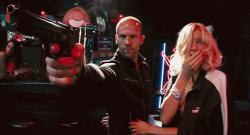In the obvious shorthand, Flame and Citron is Black Book meets Munich. Like Steven Spielberg's Munich, it's a sober thriller about how political assassins occupy uneasy moral ground, especially when they're driven by a lust for vengeance. And, like Paul Verhoeven's Black Book, it's a World War II thriller about sex and betrayal and how hard it is to trust anyone in occupied territory. I think I prefer both of those movies to this one, but Flame and Citron has its own muscles to flex. In its cool, detached regard for the predicament its protagonists find themselves in, it's probably tougher than either of them.
The title characters are two Danish resistance fighters working in the underground to execute Nazi collaborators among their countrymen. The young, idealistic gunman Flame (Thure Lindhardt) is so named due to his shock of red hair and, perhaps, his essentially good heart. The scowling Citron (Mads Mikkelsen) is the more stolid of the pair, and perhaps more reliable in crisis. Gunning down strangers left and right, they believe they are taking orders from the English, but the real provenance of the commands they receive becomes unclear. Their romantic lives are also murky. Citron has a wife who is distancing herself from him, and Flame has a woman who may be leading him to hell. The film opens with the duo embarking on a series of successful missions — generally, Flame pulls the trigger, Citron keeps the car running — but whatever the reasons, Flame finds himself increasingly reluctant to pull the trigger. He starts to wonder: are they being played?
Director Ole Christian Madsen opts for a mostly chilly look, often with spot highlights breaking up low-key lighting schemes that suggest a variant on film noir. Army of Shadows, Melville's great French-resistance drama, is often cited as a key influence, but Madsen seems equally likely to borrow images and visual ideas from glossy Hollywood movies — a scene where Flame creeps up on the Gestapo chief, Hoffmann (Christian Berkel), who lurks on the other side of a thin divider, feels like a direct lift from Blade Runner. Action scenes are executed with flair, sometimes using multiple camera set-ups from dramatic angles that suggest Michael Mann or Brian De Palma. Despite the stylistic panache, Flame & Citron maintains a generally dour sensibility.
It can be mighty slow going from scene to scene, exhibiting a portentous, relentlessly fatalistic attitude that verges on self-parody without managing to widen its scope despite gestures toward narrative expansiveness, as in the introduction of a whole host of supporting characters near the beginning of the film who never really figure into the story. The script's hectoring reversals, which seek to underscore the confusion and treachery that's afoot, get a little tiresome. But finally, and especially in the wake of an intense, extended dual climax, the film is both bracing and depressing — a cold-sweaty fable powered by the frightening crack of gunfire, the dull thrill of passion, and the threat of the double-cross.





















I think Scandinavian perceptions of heroism has a much more fatalistic approach than the standard Hollywood stuff, and it reflects in this movie. Apart from rare examples like When Trumpets Fade American war heroes seem freed from normal human psychology, remaining essentially unchanged throughout the films, never in doubt about anything.
I would say Flame and Citron is far more realistic than most war movies, which is perhaps why it doesn`t appeal to an audience conditioned in stylistic orgies of quasi-heroism:)